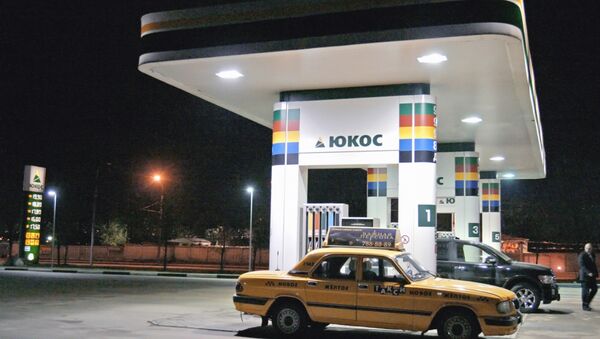MOSCOW (Sputnik) — In 2003, Russian authorities accused the leadership of Yukos, once the largest oil company in the country, of economic crimes. A range of Yukos managers were convicted over fraud and tax evasion. Yukos was later declared bankrupt and the state-controlled oil company Rosneft bought the bulk of its assets.
In 2004, Yukos filed a lawsuit against Russian tax agencies at the ECHR and interpreted such actions as an illegal confiscation of property. Yukos sued Russia for over $98 billion.
In January 2009, the ECHR accepted a part of the Yukos lawsuit on compulsory execution of tax arrears, including the sale of a 76.8-percent stake in Yuganskneftegas, the main Yukos asset, and the doubling of tax fines.
The ECHR heard this case in March 2010. After the hearings, the plaintiffs expressed hope that a decision would be made in 2010, with Russia demanding for the ECHR to reject the lawsuit.
During the hearings, a Yukos representative said Russian authorities had arbitrarily and illegally levied 19.6 billion euros ($21 billion) worth of additional taxes, penalties and fines on the company from 2000 through 2003. He also noted that the draconian enforcement of these decisions amounted to property expropriation.
The company believes that Russian authorities violated six articles of the European Convention for the Protection of Human Rights and Fundamental Freedoms, namely articles 1, 6, 7, 13, 14 and 18 and article 1 of the Convention’s Protocol 1.
The company’s demands are based on the estimated value of Yukos, which the government is allegedly aware of from court proceedings in Russia. This includes the basic 19.6 billion euro stake in Yuganskneftegaz, the value of other assets and the reimbursement of profits allegedly lost through "expropriation."
On September 20, 2011, the ECHR ruled that the actions of Russian tax authorities partially violated Yukos property rights. After hearing the lawsuit, the ECHR ruled that Russia had violated article 1 of Protocol 1 (property protection) of the European Convention for the Protection of Human Rights and Fundamental Freedoms. The court also ruled that these violations had taken place from 2000 through 2001, whereas Yukos requested that 2000-2003 violations be recognized. At the same time, the ECHR saw no evidence that the court hearings were politically motivated.
On December 21, 2011, Yukos filed an appeal against the September 2011 ECHR decision that the various processes leading to the company’s bankruptcy had not been politically motivated at the Court’s Grand Chamber.
On March 8, 2012, the ECHR decided against revising the Yukos case.
On July 31, 2014, the ECHR ruled that Russia must pay about 1.9 billion euros, including taxes, as compensation to former Yukos shareholders. The ruling requires Russia to pay 1,866,104,634 euros as compensation for the material losses sustained by Yukos shareholders, as registered at the time of the company’s liquidation, or to any successors or heirs. The court also ruled Russia liable for 300,000 euros worth of court expenses.
Russia contests the ECHR decision on the Yukos case.
The Russian Constitutional Court has noted that, although Russia remains under the jurisdiction of the court, it will execute ECHR decisions with due consideration for the supremacy of the Russian Constitution.
In October 2016, the Russian Ministry of Justice contacted the Constitutional Court and inquired whether it was possible not to execute the ECHR 2014 ruling. The ministry stated that the various obligations being imposed on Russia by the contested ruling were based on the ECHR decision to apply various provisions of the European Convention for the Protection of Human Rights and Fundamental Freedoms and to interpret them in such a manner that they run counter to the Russian Constitution.
On December 15, 2016, the Russian Constitutional Court reviewed the inquiry at its open meeting. The court ruled against any liability for the 1.9 billion euro ruling on behalf of the corporate shareholders. Representatives of the involved state agencies noted at the court session that the ECHR decision was unenforceable because it infringed upon Russia’s sovereignty and because it would hamper the country’s ability to fulfill its budget obligations to its citizens.





